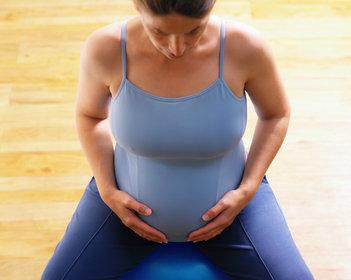Most mommies to be are aware of precautions to take in their diet, however…
Exercising During Pregnancy

You’re pregnant! Let’s workout…. Okay, maybe that’s not always the case.
Although you may not feel like running a marathon, most women benefit greatly from exercising throughout their pregnancies. But during that time, you’ll need to discuss your exercise plans with your doctor or other health care provider early on and make a few adjustments to your normal exercise routine. The level of exercise recommended will depend, in part, on your level of pre-pregnancy fitness. Even if you have never exercised regularly before, you can safely begin a workout program during pregnancy.
Benefits of Exercising During Pregnancy
No doubt about it, exercise is a big plus for both you and your baby (if complications don’t limit your ability to exercise throughout your pregnancy). It can help you: feel and look better, prepare for labor, and lose the baby weight faster.
Exercises to Try:
To begin, talk with your doctor about how much exercise you can safely perform. During pregnancy many women enjoy swimming, water aerobics, yoga, Pilates, biking, or walking. These exercises are best because they can almost be continued until the day of delivery, and they carry little risk of injury. Try for a combination of cardio (aerobic), strength, and flexibility exercises, and avoid bouncing.
Always remember to stretch before you exercise. Stretching will prepare your body for exercise and prevent injury by releasing muscle tension and making the body more flexible. Spend a minimum of 5 minutes stretching your legs, hips and knees.
Walking – it’s easy to vary the pace, add hills, and add distance. If you’re just starting, begin with a moderately brisk pace for a mile, 3 days a week. Add a couple of minutes every week, pick up the pace a bit, and eventually add hills to your route. Whether you’re a pro or a novice, go slowly for the first 5 minutes to warm up and use the last 5 minutes to cool down.
If you were a runner before you were pregnant, you might be able to continue running during your pregnancy, although you may have to modify your routine.
Yoga – it helps you breathe, relax and build strength, which can help you adjust to the physical demands of pregnancy and labor. Taking a prenatal yoga class is also a great way to meet other moms-to-be and embark on this journey together.
You do need to take a few precautions, though. If you’re attending a regular yoga class, be sure to tell the instructor you’re pregnant, and which trimester you’re in. Avoid poses that stretch the muscles too much, particularly the abdominals. You’re more at risk for strains, pulls, and other injuries right now.
In general, these poses are safe in pregnancy:
-Butterfly stretch
-Cat-Cow
-Cobra (in the first trimester, if you feel comfortable doing this face-down pose)
-Seated forward bend (place a towel or yoga strap behind your feet and hold both ends)
-Side angle pose
-Standing forward bend (with chair for modification)
-Triangle pose (with chair for modification)
Water Aerobics – Being in water will take the weight off your legs and back and you will feel more comfortable working out. Aqua aerobics has most of the fat-burning and endurance-building qualities of land-based aerobics, without the high-impact pounding that can be dangerous while pregnant. If you prenatal water aerobics are not offered in your area, then be sure to inform the instructor that you are pregnant and avoid jumping around.
Be aware
Whatever type of exercise you and your doctor decide on, the key is to listen to your body’s warnings. Your body is signaling that it’s had enough if you feel:
-fatigue
-dizziness
-heart palpitations
-shortness of breath
-pain in your back or pelvis
- Be especially aware of your lower back, hip joints, and pelvis; they are your most vulnerable areas.
- Overheating is dangerous for your baby, so during hot weather, avoid exercising outside. Also remember that swimming makes it more difficult for you to notice your body heating up because the water makes you feel cooler.
- Most doctors recommend that pregnant women avoid exercises after the first trimester that require them to lie flat on their backs.
Unless your doctor tells you otherwise, it’s also wise to avoid any activities that include:
-bouncing
-leaping
-a sudden change of direction
-a risk of abdominal injury
Hope these help and if you are expecting, congratulations!



